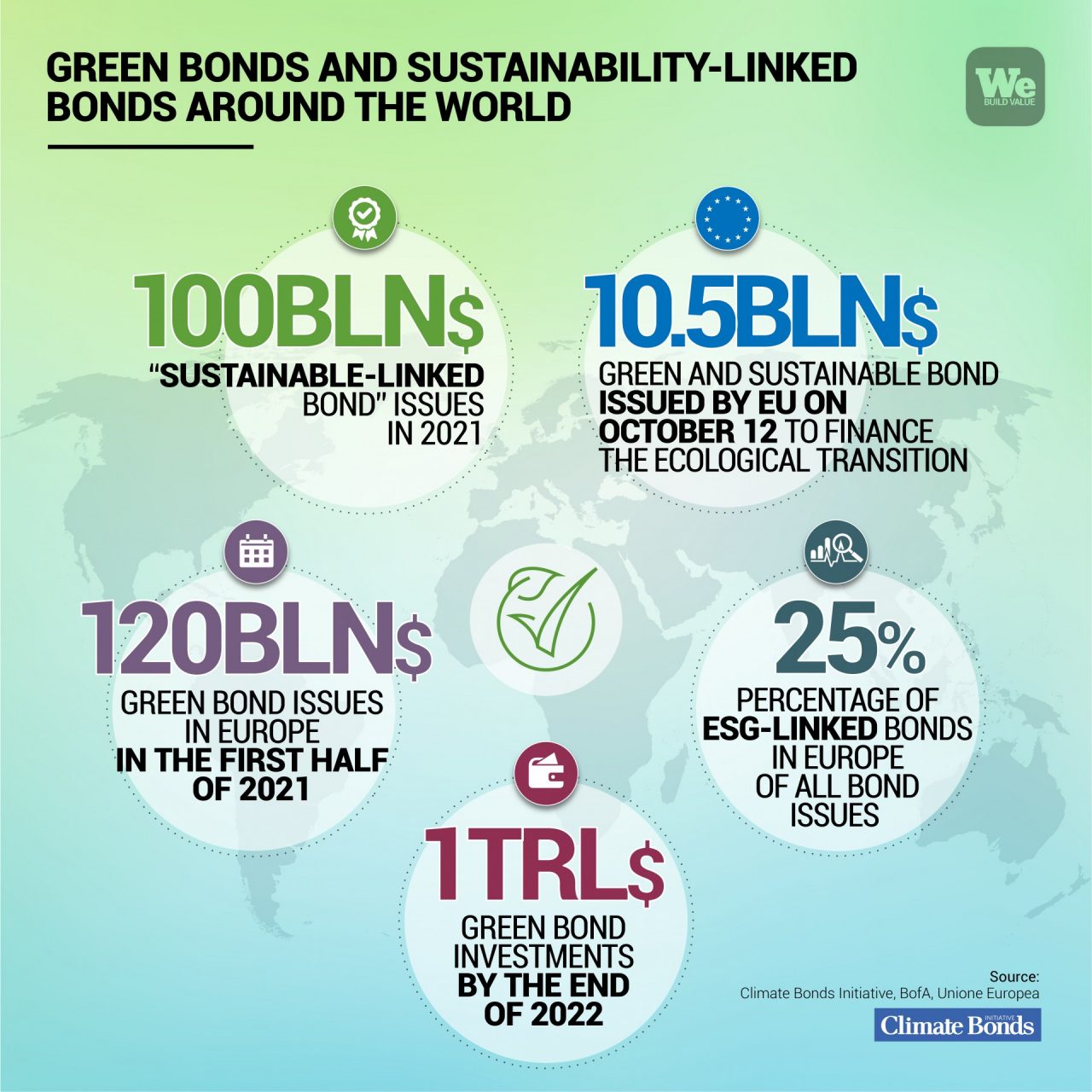The market for green bonds has exploded in recent years, because this financial instrument reconciles the needs of large companies to raise capital with an increasing demand for sustainable development from investors and stakeholders.
According to the Climate Bond Initiative, a nonprofit that launched the world’s first green bond Certification programme in 2010, green bond investment could reach the $1 trillion-mark (€882 billion) in a single year by the end of 2022. In Europe, ESG-linked bonds (bonds linked to the achievement of the UN’s Sustainability Goals) could easily represent about 25% of all bond issues by the end of 2021, according to a June report from Scope Ratings, another leading center of financial market analysis.
Companies and governments are increasingly on the same page: they all now issue green bonds in order to finance projects useful to improve their ESG ratings as well as achieve the Paris Agreement targets to limit climate change to an increase of less than 2.0 degrees Celsius above pre-industrial levels.
In this sense, a central role is played by infrastructure, which is increasingly linked to sustainability through greener construction sites, materials inspired by environmental protection, and projects that contribute to reducing air pollution. This comes in the form of sustainable mobility, from city subways to high-speed trains; clean energy, wastewater treatment, and all those infrastructures that contribute to reducing man’s impact on the environment.
European development linked to green bonds
Europe can now be considered the center of gravity for green bonds. The Climate Bond Initiative reports that most issuers are concentrated in the European Union (in the first half of 2021 alone, green bond issues in Europe reached $120 billion, or €106 billion). The European Commission has identified this instrument as one of the drivers of development of the post-Covid economic recovery plan. In fact, the European Commission has announced that it intends to raise 30% of the funds needed to finance the Next Generation EU stimulus plan through the issue of green bonds. Following this principle, on October 12, the EU issued a green and sustainable bond to finance the ecological transition that raised $12 billion (€10.5 billion), and attracted eleven times more orders than the amount offered.
The fact that 10% of subscriptions came from Italy confirms the leading role of the country in green bonds, which was further underlined by the government’s choice on March 3, 2021 to issue its first Green BTP with maturity 2045 for a value of €8.5 billion ($9.6 billion), attracting a demand that was 10 times higher than the offer.
Webuild’s sustainability-linked bond
The Italian companies with an eye on sustainable development are reshaping their financing plans to include green bonds. Webuild Group, one of the main global players in the complex infrastructure sector, is among those that have decided to use this instrument to finance the construction of works that are increasingly in line with the Paris Agreement climate change targets. The intention, once again, is to support efforts to slow global warming as well as the Group’s many steps in recent years that reduce harmful emissions as much as possible in its construction sites around the world.
Webuild Group’s environmentally-friendly projects range from the redevelopment of the Riachuelo River in Buenos Aires (one of the most polluted waterways in Latin America); water treatment in Washington D.C. rivers; construction of the Grand Paris Express (the largest subway line currently being built in the world); and hydroelectric plants built from Ethiopia to Australia. Webuild now focuses substantially on the creation of green infrastructure.
That’s why Webuild Group’s board of directors has decided to start evaluating market conditions for a potential issue of a “sustainability-linked bond.”
According with BofA, in 2021 “sustainablity-linked bonds” issues will reach $ 100 billion, which inn Webuild’s case will be linked to achieving reduction in greenhouse gas emissions.
Webuild has appointed BofA Securities, Goldman Sachs International, IMI – Intesa Sanpaolo, Natixis, and UniCredit as Joint Lead Managers, and Banca Akros (Gruppo Banco BPM, BNP Paribas and BBVA) as Co-Managers to organise a roadshow with qualified Italian and international investors, with the aim of assessing market conditions for the potential issue of senior unsecured fixed-rate bonds linked to sustainability performance.
The proceeds of bond will be used to refinance part of the Group’s existing debt, and for general purposes. The bonds will be reserved exclusively for qualified investors, excluding the United States of America and certain other countries, and will be listed on the Global Exchange Market of the Dublin Stock Exchange (Euronext Dublin).
These “Sustainability-linked bonds” will be in line with the provisions of the “Sustainability-Linked Financing Framework” approved by Webuild’s Board of Directors on November 25.
The price that the Group will pay for financing will be linked to the achievement of environmental targets, which will be assessed by an independent third party. The Framework has been evaluated by Vigeo Eiris, an independent body for ESG issues, which has issued a Second Party Opinion on the relevance of the issue for the construction sector, its uniformity with corporate strategy and the level of ambition of the target, and certifying its alignment with international standards.
Sustainable infrastructure at the service of sustainable development
The project of launching a “sustainability-linked bond” is aligned with Webuild’s goal of focusing on new financial instruments linked to sustainability objectives, thus contributing to the achievement of the UN’s Sustainable Development Goals, which provide a roadmap for industry, innovation and infrastructure. 87 million people around the world will benefit from Webuild’s sustainable projects. Specifically, 32.2 million people will be served by the sustainable mobility projects completed by Webuild; and 17.1 million people will use the water treated in the plants built by the Group. The issue of a green bond will help to further increase these numbers.



